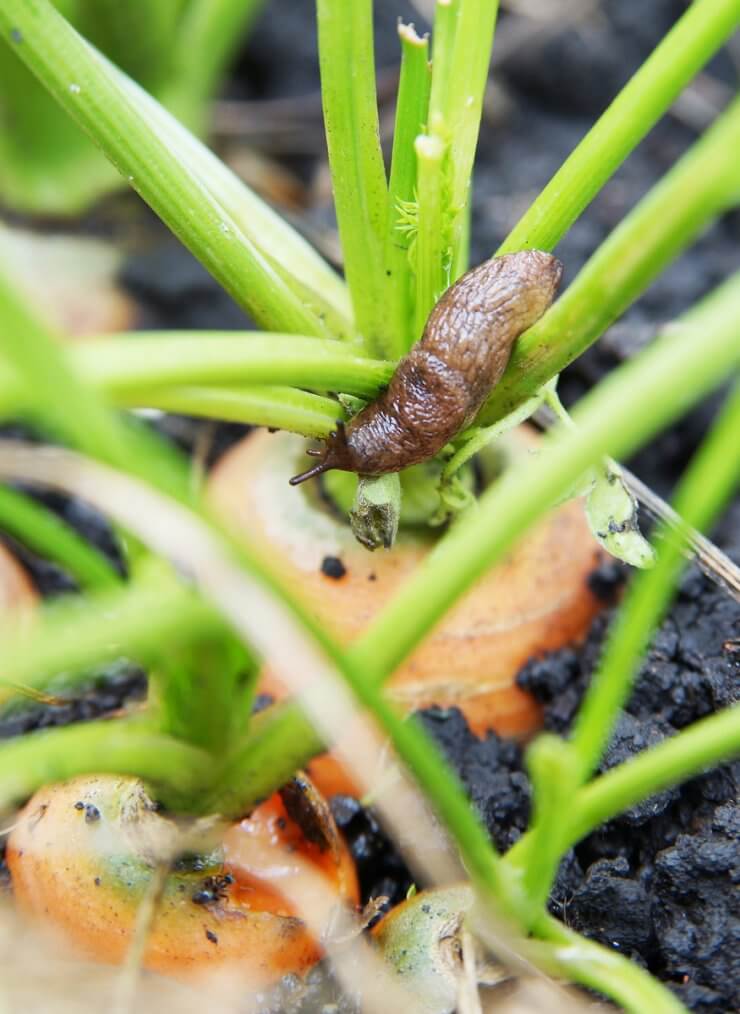
Slug eating carrots in the garden
Pests on your carrots, left unchecked, can damage and destroy your lovely plants. Keeping a close watch on your plants during regular daily inspections will help you spot any pests before they can do irreparable harm.
Spot the symptoms of carrot plant pests
Check leaves and roots for these symptoms that come from pests on the prowl.
On Carrot Leaves
| Symptoms | Pest |
|---|---|
| Yellowing leaves; clusters of small “bumps” on leaves | Aphids |
| Discolored or distorted leaves; scarred leaves; silvery look to leaves | Thrips |
On Carrot Roots
| Symptoms | Pest |
|---|---|
| Rusty brown tunnels under the skin of the root | Carrot rust flies |
How to treat pests on carrots
Here are some proven ways to get rid of pests on your carrots. Choose the best treatment for the type of pests invading your plants.
- Pick off the pests. Use your garden gloves to remove the pests by hand. After removal, destroy pests by drowning them in a bucket of soapy water or crushing them with your foot. Handpicking isn’t efficient or practical for very small pests, but works well with larger pests.
- Blast ‘em. If you spot invaders like aphids, give them a good blast with the garden hose. Chances are good the neighborhood birds will notice and come eat your pests.
- Apply insecticidal soap. Insecticidal soap is organic. The potassium salts in insecticidal soap help remove an insect’s protective waxes, causing destruction of insect membranes and killing them. Mix the soap with water to create your solution, and apply directly to insects on any plants. While insecticidal soap is less apt to affect other organisms, certain plants might be sensitive to the soap and can suffer leaf burn.
- Apply horticultural oils. Combine plant- or petroleum-based oils with water to produce horticultural sprays. Neem oil, for instance, is derived from seed extracts of the neem plant. Oil-based sprays block an insect’s air holes, interfere with an insect’s metabolism, disrupt insect feeding, and inhibit insect growth. Like insecticidal soaps, horticultural oils can cause plant injury if not properly diluted.
- Make your own pest spray. You can make your own pest spray with benign materials. Mix 1 tablespoon of baking soda, 1/2 teaspoon of a mild dish detergent, and 2 1/2 tablespoons of olive oil in a gallon of water to make a solution that will repel all kinds of bugs, as well as a fungicide for blight and mildew on carrot plant leaves. Shake it well in your bottle before spraying and repeat every week for it to be continuously effective.
- Use row covers or another barrier. Carrot rust flies are low flyers, so you may be able to thwart them if you use row covers as your carrots are first growing. Later, you can build a barrier—about 3 feet high—around your carrot patch using fine mesh, rigid plastic, or even plastic film. Just be sure to create some sort of gate so you can get in to tend your carrots.
Do pests attack your carrots every year? How do you handle removing them—and even preventing them in the first place? Please tell us how you treat your carrots to avoid pests.


 Previous
Previous

